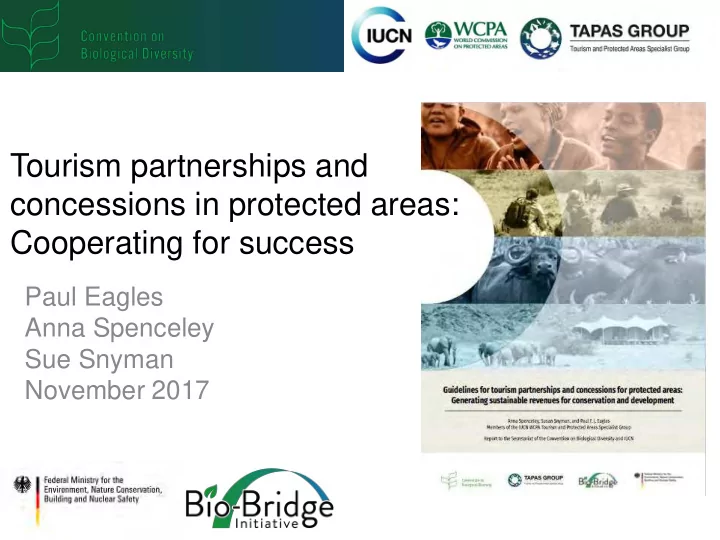

Tourism partnerships and concessions in protected areas: Cooperating for success Paul Eagles Anna Spenceley Sue Snyman November 2017
Paul Eagles, Anna Spenceley, Sue Snyman
The why of the project • Secretariat of the Convention on Biological Diversity work on biodiversity and tourism • Under-use of tourism to finance conservation in protected areas • Need identified for guidelines, better capacity, networks, and sharing of technical information
Who ran the project: IUCN World Commission on Protected Areas (WCPA) Specialist Group Voluntary technical network (500+) Specialists on tourism and protected areas and areas of particular importance to biodiversity
Two complementary components: 1) Capacity building initiatives evaluating and promoting tourism concessions and partnerships in protected areas – German Ministry of Environment (BMUB) 2) Cooperation for development of tourism concession guidelines and policies within southern African protected area systems – Bio-Bridge Initiative (BBI) financed by the Government of the Republic of Korea
Our process Networking – promoting and supporting technical & scientific cooperation Capacity Guidelines development – sharing of technical and - sharing technical & scientific knowledge & best scientific knowledge practices Planning additional Better actions concessions Needs assessment – sustaining technical and & scientific partnerships cooperation
Promoting technical and scientific cooperation A survey of delegates allowed for an effective information basis for presentations and discussions Group learning and cooperation (experienced with non-experienced) Personal relationships useful for future cooperation, technical support and shared learning Group speed dating allowed for one-on-one discussions and sharing On-site activities Ability to propose follow-up activities ensured future cooperation as involved in creation of ideas TAPAS Group and email groups ensure extensive sharing of technical and scientific knowledge Improved understanding of tourism concessions and partnerships among 37 protected area representatives from 13 countries in southern Africa
iSimangaliso meeting participants Working group session Field trip
Enhancing technical and scientific cooperation between the parties: • ‘Speed - dating’ - creating a relatively informal and enjoyable atmosphere for networking • Host-country presentations: A structured format was provided to participants, drafts reviewed prior to the meeting to ensure learning • Flexibility: Accommodating additional presentations offered by the participants, and sharing their materials. • Varying the style of sessions (e.g. presentations, plenary discussion, field trips, invited speakers) to enhance cooperation • Facilitators with varied backgrounds and different skills • Delegate to delegate discussions on the lessons learned, the strengths and weaknesses of various approaches, and problems to be avoided. • On-site visits involving sharing of technical and scientific knowledge
Namibia meeting participants Mozambique meeting participants Working group in Namibia Field trip to Anvil Bay in Mozambique
Sustaining technical and scientific cooperation: • Countries already reporting policy and policy instrument adaptation: Malawi – developing a concession monitoring framework, using discussions o and tools shared. Proposal to review concession submissions anticipated based on learnings from the workshops. o Zimbabwe - pursuing an auction for “photographic” tourism concession sites and working on an auction brochure to try and include a screening process. o Mozambique – use of materials to work on the harmonization of concessions in protected areas. o Madagascar – adaptation of the legal framework for tourism concessions. • Creation of a collaborative network due to the comradely ‘spirit’ of the workshop and ‘buddy’ system • Numerous countries mentioned follow-up initiatives, including collaborating with other countries & further sharing technical and scientific knowledge and experience
Draft components requiring funding for Phase 2 to foster sustained TSC • Component 1 : Capacity building on tourism concessions and partnerships in protected areas in other regions • Component 2 : Scaled-up country-specific capacity building and networking in southern Africa • Component 3 : Online training modules to support tourism concessioning internationally • Component 4 : Research on protected area financing from tourism • Component 5 : Exchange visit of African and Latin American delegates to Canada • Component 6 : Online tourism concession investment promotion platform
Thank you to all who were involved in, and supported, the project: All country participants and Mozambican, Namibian, and South African authorities for logistical, technical and scientific support
THANK YOU FOR YOUR TIME Dr. Paul F. J. Eagles IUCN WCPA Tourism and Protected Areas Specialist Group Distinguished Professor Emeritus, University of Waterloo, Canada Email: eagles@uwaterloo.ca
Recommend
More recommend